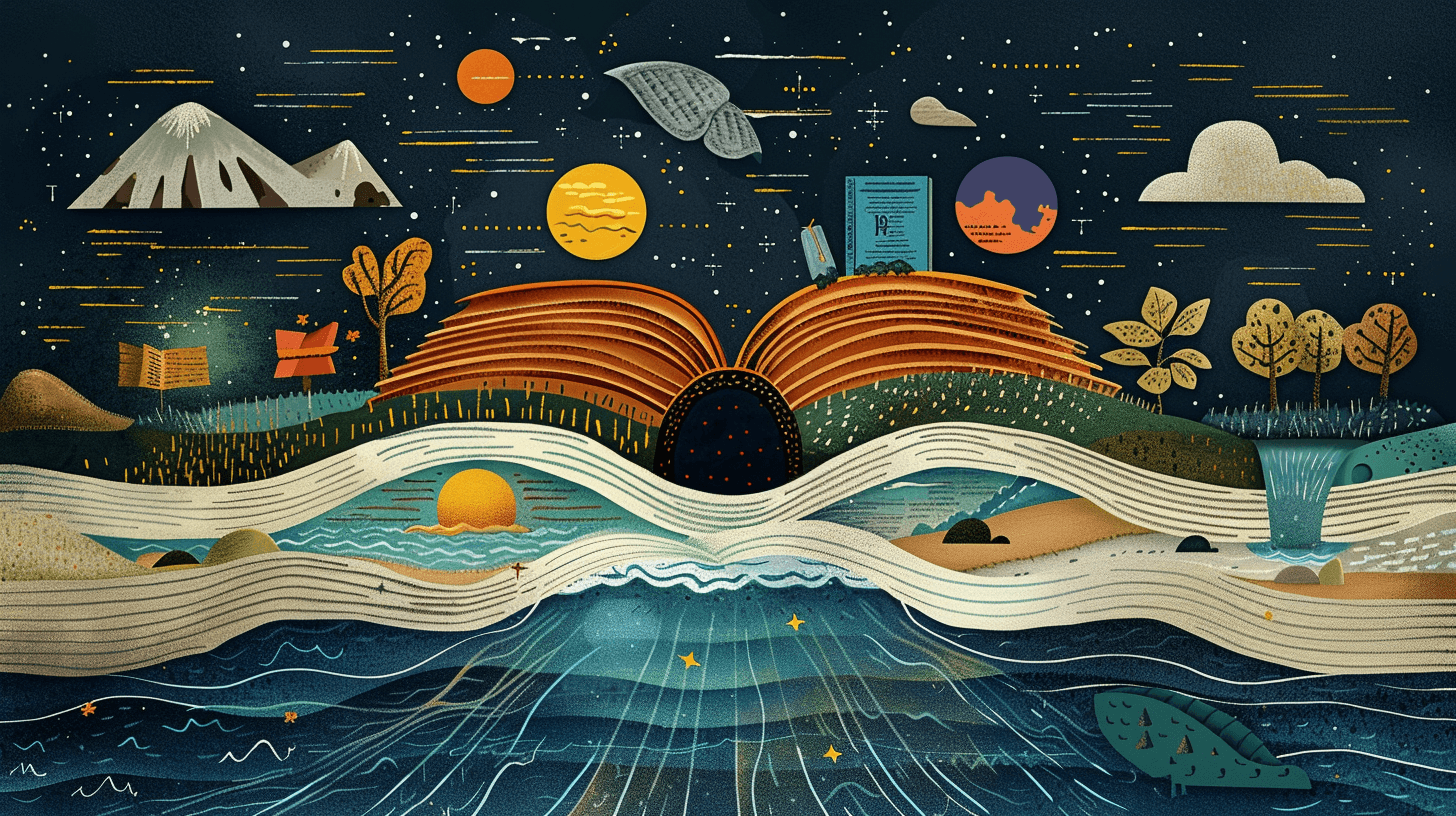Introduction: Why Eastern Philosophy Is Key to Unlocking Higher Consciousness

In an increasingly complex and fast-paced world, the search for deeper meaning and connection is more pertinent than ever. Eastern philosophy, with its rich tapestry of spiritual wisdom, offers a profound pathway to achieving higher consciousness—a state of expanded awareness where one transcends the limitations of the ego and experiences a deep connection with the universe.
While Western thought has often focused on external achievements and material success, Eastern traditions invite us to look inward, challenging us to explore the depths of our own consciousness. This inward journey is not just about personal growth; it’s about fundamentally transforming how we perceive ourselves and the world around us.
In this article, we will explore the best books on Eastern philosophy and higher consciousness, offering both theoretical insights and practical applications. Our goal is to provide a guide that not only informs but also inspires and empowers you to embark on or deepen your spiritual journey. By deconstructing conventional assumptions and approaching the subject from its core fundamentals, we aim to offer novel insights that reshape your understanding of consciousness and spirituality.
Understanding Eastern Philosophy and Higher Consciousness

Eastern philosophy is a broad term that encompasses the spiritual and philosophical traditions that have emerged in Asia, particularly in regions such as India, China, Japan, and Southeast Asia. These traditions include Hinduism, Buddhism, Taoism, Confucianism, and Zen, among others. Each tradition offers unique perspectives on the nature of reality, the self, and the path to spiritual enlightenment.
What distinguishes Eastern philosophy from its Western counterpart is its emphasis on holistic thinking, the interconnectedness of all things, and the pursuit of inner wisdom. While Western philosophy often seeks to analyze and categorize, Eastern philosophy encourages a more intuitive and experiential approach to understanding the world.
What Is Higher Consciousness?
Higher consciousness is a state of awareness that transcends the ordinary, ego-bound level of consciousness. It involves a profound shift in perception, where one experiences a sense of unity with all existence, free from the dualistic thinking that typically characterizes our everyday awareness.
In many Eastern traditions, higher consciousness is equated with enlightenment, self-realization, or spiritual awakening. It is seen as the ultimate goal of the spiritual journey, representing a state of pure awareness, compassion, and wisdom. This state is not about escaping reality but about perceiving it in its truest, most fundamental form.
The Relationship Between Eastern Philosophy and Higher Consciousness
Eastern philosophy provides a comprehensive framework for understanding and achieving higher consciousness. The teachings of non-duality, mindfulness, and the Tao, among others, offer practical tools for dissolving the ego and expanding one’s awareness. These traditions emphasize that higher consciousness is not something to be attained in the future but is a realization that can occur in the present moment, through disciplined practice and self-inquiry.
By engaging with Eastern philosophy, one can begin to dismantle the layers of conditioning and false identities that obscure the true nature of the self. This process is not about acquiring new knowledge but about unlearning and returning to a state of pure being.
Top Categories of Books on Eastern Philosophy and Higher Consciousness

Classical Texts and Their Relevance Today
The foundational texts of Eastern philosophy offer timeless wisdom that continues to resonate with modern readers. These texts are not just historical artifacts; they are living guides that offer profound insights into the nature of consciousness and the path to spiritual awakening.
Bhagavad Gita (Hinduism): The Bhagavad Gita is one of the most revered texts in Hindu philosophy. It presents a conversation between Prince Arjuna and the god Krishna, who serves as his charioteer. The Gita addresses the moral and philosophical dilemmas faced by Arjuna as he prepares for battle, ultimately teaching the path of righteousness (Dharma) and the importance of selfless action (Karma Yoga). The text offers profound insights into the nature of the self, the universe, and the process of spiritual liberation (Moksha).
Tao Te Ching (Taoism): Attributed to the ancient Chinese sage Laozi, the Tao Te Ching is a foundational text of Taoism. It explores the nature of the Tao (the Way), a fundamental principle that underlies and unifies all of existence. The text emphasizes the importance of living in harmony with the Tao through the practice of Wu Wei (non-action), which involves aligning with the natural flow of life rather than resisting it. The Tao Te Ching’s teachings on simplicity, humility, and balance are highly relevant in today’s fast-paced, materialistic society.
The Dhammapada (Buddhism): The Dhammapada is a collection of sayings of the Buddha that encapsulates the essence of his teachings. It covers topics such as mindfulness, ethical conduct, and the nature of suffering (Dukkha). The text offers practical guidance on how to cultivate wisdom, compassion, and inner peace, making it an invaluable resource for those seeking to achieve higher consciousness.
Modern Interpretations and Applications
While the classical texts provide the foundation, modern interpretations of Eastern philosophy make these ancient teachings accessible and applicable to contemporary life. These books bridge the gap between traditional wisdom and modern challenges, offering practical advice for integrating spiritual principles into everyday life.
The Power of Now by Eckhart Tolle: Eckhart Tolle’s seminal work has become a cornerstone of modern spirituality. Drawing on concepts from Buddhism, Hinduism, and other Eastern traditions, Tolle emphasizes the importance of living in the present moment as the key to spiritual awakening. He challenges the reader to transcend the mind’s constant chatter and the ego’s desire for control, leading to a state of inner peace and higher consciousness.
The Seven Spiritual Laws of Success by Deepak Chopra: Deepak Chopra’s book modernizes Eastern concepts like karma, Dharma, and meditation, making them accessible to a Western audience. Chopra presents spiritual laws that, when practiced, lead to success in both material and spiritual realms. The book’s practical approach makes it an excellent resource for those seeking to apply Eastern philosophy to achieve personal and professional goals while maintaining spiritual integrity.
Man’s Search for Meaning by Viktor Frankl: While not an Eastern text, Viktor Frankl’s exploration of the search for meaning in the face of suffering aligns closely with Eastern philosophies of transcending the ego and finding purpose beyond material existence. Frankl’s emphasis on the human capacity for self-transcendence resonates with the Eastern concept of moving beyond the self to achieve higher states of consciousness.
Books on Meditation and Mindfulness
Meditation and mindfulness are central practices in Eastern traditions, serving as tools for cultivating higher consciousness. The following books offer both theoretical insights and practical guidance for those seeking to deepen their meditation practice.
Wherever You Go, There You Are by Jon Kabat-Zinn: Jon Kabat-Zinn, the founder of Mindfulness-Based Stress Reduction (MBSR), offers a practical introduction to mindfulness meditation. The book emphasizes the importance of being fully present in each moment, offering simple exercises and reflections that can be integrated into daily life. Kabat-Zinn’s approach demystifies mindfulness, making it accessible to beginners while offering depth for more experienced practitioners.
The Miracle of Mindfulness by Thich Nhat Hanh: Vietnamese Zen master Thich Nhat Hanh offers a gentle yet profound guide to mindfulness in this classic book. The Miracle of Mindfulness provides practical exercises for cultivating awareness in everyday activities, such as eating, walking, and breathing. Thich Nhat Hanh’s teachings emphasize the importance of compassion, interbeing, and living in harmony with the present moment.
Mindfulness in Plain English by Bhante Henepola Gunaratana: Bhante Henepola Gunaratana’s book is a clear and comprehensive guide to the practice of Vipassana meditation, also known as insight meditation. Mindfulness in Plain English breaks down the principles of mindfulness and offers practical advice for developing concentration, mindfulness, and insight. The book is an invaluable resource for those looking to deepen their meditation practice and achieve higher states of consciousness.
Mysticism and Esoteric Traditions
For those drawn to the more mystical and esoteric aspects of Eastern philosophy, the following books offer a deep dive into the mysteries of existence and the nature of higher consciousness.
The Essential Rumi by Coleman Barks: This collection of poems by the 13th-century Persian mystic Rumi offers timeless insights into the nature of love, the soul, and the divine. Rumi’s poetry transcends religious boundaries, inviting readers to experience the ecstatic union with the divine that lies at the heart of all mysticism. His works resonate with the teachings of Sufism, a mystical branch of Islam that shares common ground with Eastern philosophies in its emphasis on the dissolution of the ego and the realization of divine unity.
The Tibetan Book of the Dead (Bardo Thodol): The Tibetan Book of the Dead is a key text in Tibetan Buddhism, offering guidance on the process of dying and the journey of the soul through the intermediate state (bardo) between death and rebirth. The book provides profound insights into the nature of consciousness and the process of spiritual liberation. It is both a practical guide for navigating the afterlife and a profound meditation on the impermanence of life and the continuity of consciousness.
The Secret Teachings of All Ages by Manly P. Hall: This encyclopedic work explores the esoteric teachings of ancient civilizations, secret societies, and mystical traditions. Manly P. Hall’s book offers a comprehensive overview of the hidden knowledge that has been passed down through the ages, inviting readers to explore the deeper mysteries of existence. The book’s exploration of symbolism, myth, and spiritual philosophy aligns with the Eastern emphasis on the interconnectedness of all things and the pursuit of higher knowledge.
How to Choose the Right Book for Your Spiritual Journey

Choosing the right book on Eastern philosophy and higher consciousness begins with an honest assessment of where you are on your spiritual journey. Are you a beginner seeking foundational knowledge, or are you an advanced practitioner looking to deepen your understanding of complex concepts? Your current level of experience and understanding will guide your choice.
For those new to Eastern philosophy, starting with accessible texts like “The Power of Now” by Eckhart Tolle or “Wherever You Go, There You Are” by Jon Kabat-Zinn can provide a solid foundation. These books introduce key concepts in a way that is easy to understand and apply to daily life.
Intermediate seekers might find value in exploring more in-depth texts such as the “Bhagavad Gita” or “The Seven Spiritual Laws of Success.” These books delve deeper into the philosophical underpinnings of Eastern traditions and offer practical guidance for integrating these teachings into everyday life.
Advanced practitioners may be drawn to esoteric texts like “The Tibetan Book of the Dead” or “The Secret Teachings of All Ages.” These books challenge the reader to explore the more mystical aspects of consciousness and the deeper mysteries of existence.
Aligning with Your Path
It’s important to choose books that resonate with your personal spiritual path. If you are drawn to the teachings of a particular tradition, such as Buddhism, Hinduism, or Taoism, consider starting with the foundational texts of that tradition. For example, those interested in Buddhism might begin with “The Dhammapada” or “The Miracle of Mindfulness,” while those drawn to Hinduism might explore the “Bhagavad Gita” or “Autobiography of a Yogi.”
If you are seeking a more universal approach that transcends specific traditions, books like “The Power of Now” or “The Essential Rumi” offer teachings that are accessible to people of all backgrounds and beliefs. These texts emphasize the universal principles of mindfulness, presence, and self-realization that are central to all spiritual paths.
Exploring New Perspectives
While it’s important to honor your own spiritual path, it can also be valuable to explore perspectives from other traditions. This cross-pollination of ideas can lead to new insights and a deeper understanding of your own beliefs.
For example, a practitioner of Zen Buddhism might find inspiration in the Taoist teachings of the “Tao Te Ching,” while a student of Hinduism might gain new insights from the Buddhist concept of mindfulness. By exploring the commonalities and differences between various traditions, you can enrich your spiritual journey and broaden your understanding of higher consciousness.
Practical Tips for Engaging with Eastern Philosophy and Higher Consciousness Books

Approaching your reading as a meditative practice can deepen your engagement with the material and help you internalize the teachings. Before you begin reading, take a few moments to center yourself with a brief meditation or deep breathing exercise. Set an intention for your reading session, such as gaining insight into a particular concept or opening your mind to new perspectives.
As you read, practice mindfulness by paying close attention to each word and allowing the teachings to resonate within you. If a particular passage stands out, pause to reflect on its meaning and consider how it applies to your own life. This mindful approach to reading not only enhances your understanding but also transforms the act of reading into a spiritual practice in itself.
Reflective Reading Techniques
To deepen your understanding of the material, consider incorporating reflective reading techniques such as journaling, group discussions, and meditation on key passages.
Journaling: Keep a journal where you can write down your thoughts, reflections, and insights as you read. Journaling helps you process the material and make connections between the teachings and your own experiences. You might also use your journal to record questions or challenges that arise during your reading, which you can revisit later for further contemplation.
Group Discussions: Discussing the material with others can provide new perspectives and deepen your understanding. Consider joining a book club or study group focused on Eastern philosophy and higher consciousness. Sharing your thoughts and hearing different interpretations can lead to richer insights and a more well-rounded understanding of the teachings.
Meditation on Key Passages: After reading a particularly resonant passage, spend some time meditating on it. Let the words settle in your mind and heart, and notice how they affect your inner state. This practice can help you internalize the teachings and integrate them into your consciousness.
Integrating Teachings into Daily Life
The true value of a book on Eastern philosophy and higher consciousness lies in how you apply its teachings to your daily life. After reading a book, reflect on how you can integrate the insights into your routine, relationships, and spiritual practice.
For example, if a book teaches about mindfulness, try incorporating mindful moments throughout your day—whether it’s during meals, while walking, or in conversations. If a book emphasizes compassion, look for opportunities to practice kindness and understanding with those around you.
By integrating the teachings into your life, you bring the wisdom of the book to life, allowing it to transform you from within
Common Challenges and How to Overcome Them

Avoiding Overwhelm
With so many spiritual books available, it’s easy to feel overwhelmed by the sheer volume of material. To avoid overwhelm, focus on quality over quantity. Choose one or two books that resonate with you and commit to reading them deeply, rather than trying to read everything at once.
Remember that spiritual growth is a lifelong journey, and there is no need to rush. Allow yourself the time to fully engage with each book, trusting that the right books will come to you at the right time.
Balancing Study with Practice
It’s important to balance the intellectual study of spirituality with actual practice. While reading can provide valuable insights, true spiritual growth comes from applying those insights to your life.
Make sure to balance your reading with other spiritual practices, such as meditation, prayer, or service. This integration helps ensure that your spiritual growth is holistic and grounded in lived experience, rather than remaining purely theoretical.
Navigating Complex Concepts
Some spiritual books present complex or abstract concepts that can be difficult to grasp. If you find yourself struggling with a particular passage, try breaking it down into smaller parts and reflecting on each one individually.
It can also be helpful to use supplementary resources, such as commentaries, guides, or online forums, where you can gain additional insights and ask questions. Don’t be afraid to take your time with difficult material—sometimes, the most profound insights come from persistent exploration.
Recommended Reading Lists for Different Stages of the Spiritual Journey

For Beginners: Foundational Texts
If you’re new to Eastern philosophy and higher consciousness, start with books that provide a clear and accessible introduction to the core concepts.
The Power of Now by Eckhart Tolle: This modern classic introduces the concept of living in the present moment as the key to spiritual awakening. Tolle’s teachings are accessible and practical, making this an excellent starting point for beginners.
The Miracle of Mindfulness by Thich Nhat Hanh: Thich Nhat Hanh’s gentle guidance on mindfulness offers a simple yet profound approach to living with awareness and compassion. The book’s practical exercises make it easy to integrate mindfulness into your daily life.
The Four Agreements by Don Miguel Ruiz: While rooted in Toltec wisdom rather than Eastern philosophy, “The Four Agreements” offers universal teachings that align with the principles of higher consciousness. Ruiz’s clear and concise writing makes this book an accessible and inspiring read for beginners.
For Intermediate Seekers: Deepening Understanding
For those with some experience in spiritual practices, these books offer more advanced insights and challenge existing beliefs. They encourage deeper exploration and personal growth.
Autobiography of a Yogi by Paramahansa Yogananda: This spiritual classic offers a first-person account of Yogananda’s journey to self-realization and the teachings of his guru, Sri Yukteswar. The book provides a deep dive into the philosophy and practice of Kriya Yoga, making it an essential read for those seeking to deepen their spiritual practice.
The Seven Spiritual Laws of Success by Deepak Chopra: Chopra’s modern interpretation of ancient spiritual principles offers practical guidance for achieving success in both material and spiritual realms. The book’s emphasis on aligning with the natural laws of the universe resonates with those seeking to deepen their understanding of Eastern philosophy.
The Road Less Traveled by M. Scott Peck: While not specifically an Eastern text, Peck’s exploration of discipline, love, and spiritual growth aligns closely with Eastern teachings on self-mastery and inner transformation. The book challenges readers to confront their own limitations and embark on a path of personal and spiritual growth.
For Advanced Practitioners: Esoteric Wisdom
For advanced practitioners seeking profound spiritual insights and transformative experiences, these books delve into esoteric teachings, mystical experiences, and the integration of spiritual wisdom into all aspects of life.
The Tibetan Book of the Dead (Bardo Thodol): This key text in Tibetan Buddhism offers guidance on the process of dying and the journey of the soul through the intermediate state (bardo) between death and rebirth. The book’s profound insights into the nature of consciousness and spiritual liberation make it an essential read for advanced practitioners.
The Essential Rumi by Coleman Barks: Rumi’s mystical poetry invites readers to experience the ecstatic union with the divine that lies at the heart of all mysticism. His teachings resonate with advanced practitioners seeking to dissolve the ego and experience divine unity.
The Kybalion by Three Initiates: This esoteric text explores the principles of Hermetic philosophy, offering a deep dive into the mysteries of existence and the nature of higher consciousness. The book’s exploration of the principles of mentalism, correspondence, and vibration aligns with the teachings of Eastern philosophy and provides profound insights for advanced practitioners.
Books for Specific Spiritual Traditions
Zen Buddhism: “Zen Mind, Beginner’s Mind” by Shunryu Suzuki
Hinduism: “The Upanishads” translated by Eknath Easwaran
Taoism: “The Book of Chuang Tzu” translated by Martin Palmer
Conclusion: Embarking on a Lifelong Journey of Higher Consciousness

The journey toward higher consciousness is a deeply personal and transformative path that requires dedication, openness, and a willingness to explore the deeper dimensions of existence. Eastern philosophy offers a wealth of wisdom and practical guidance for those seeking to embark on or deepen this journey.
As you explore the books discussed in this article, remember that the true value of these teachings lies not in the words themselves but in how you integrate them into your life. By applying the insights you gain from these books, you can cultivate a deeper connection with your true self and the universe, leading to a life of greater peace, compassion, and fulfillment.
Whether you are a beginner just starting your journey or an advanced practitioner seeking to deepen your understanding, there is a book—and a teaching—that is right for you. The path to higher consciousness is not a destination but a lifelong journey of growth, discovery, and transformation.
We encourage you to begin or continue your exploration of Eastern philosophy and higher consciousness with an open heart and mind. Engage with the teachings, reflect on your experiences, and share your journey with others. Together, we can create a more enlightened and harmonious world, one step at a time.







